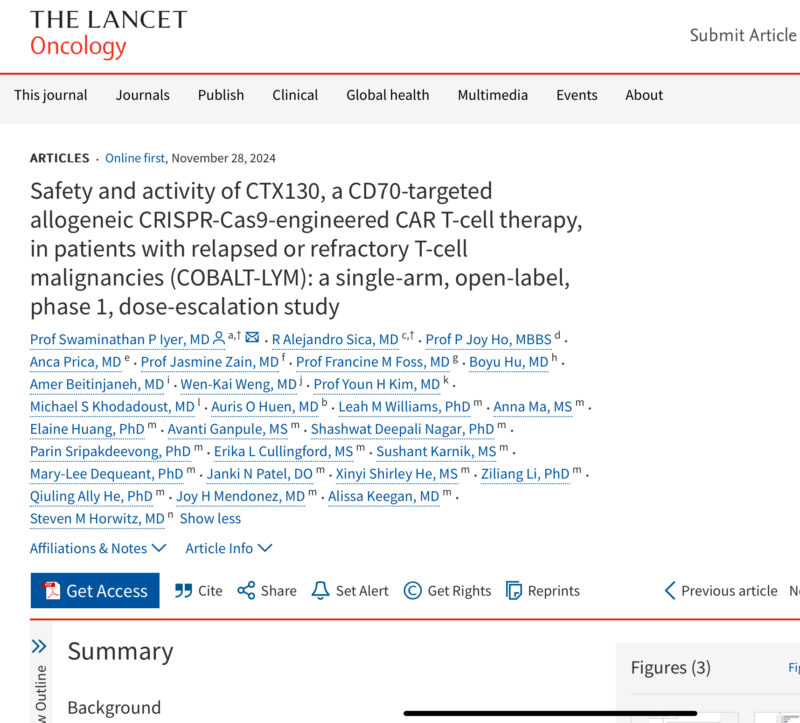
Miguel Bronchud: Interesting single-arm, open-label, phase 1 study on CRISPR Therapeutics by Swaminathan Iyer et al.
Miguel Bronchud, Co-Founder of Regenerative Medicine Solutions, shared a post on LinkedIn, about a recent paper by Swaminathan Iyer et al. published in The Lancet Oncology.
“CRISPR Therapeutics? Interesting single-arm, open-label, phase 1 study reported in The Lancet Oncology.
Phase 1 trial done at ten medical centres across the USA, Australia, and Canada in patients (aged ≥18 years) with relapsed or refractory peripheral T-cell lymphoma or cutaneous T-cell lymphoma, who had received at least one or at least two previous systemic therapy lines, respectively, and had an Eastern Cooperative Oncology Group (ECOG) performance status of 0–1.
Effective treatment options are scarce for relapsed or refractory T-cell lymphoma. This study assesses the safety and activity of CTX130 (volamcabtagene durzigedleucel), a CD70-directed, allogeneic chimeric antigen receptor (CAR) immunotherapy manufactured from healthy donor T cells, in patients with relapsed or refractory T-cell lymphoma.
Patients underwent lymphodepletion with fludarabine 30 mg/m2 and cyclophosphamide 500 mg/m2 (intravenously daily for 3 days), followed by intravenous CTX130 infusion at dose levels ranging from 3 × 107 CAR+ T cells (dose level 1) to 9 × 108 CAR+ T cells (dose level 4).
The primary endpoint was the incidence of adverse events, defined as dose-limiting toxicities occurring within 28 days post-infusion. Secondary endpoints included objective response rate. Safety and activity analyses were performed on data from all patients who received CTX130. The trial is registered with ClinicalTrials.gov (NCT04502446) and EudraCT (2019-004526-25) and is closed to enrolment.
Besides expected low blood counts (including low platelets), Serious adverse events occurred in 25 (64%) patients, with CTX130-related serious adverse events in 14 (36%) patients, the most common related serious adverse event being cytokine release syndrome in 11 (28%) patients.
21 patients died, 16 from progressive disease and five from adverse events considered unrelated to CTX130 treatment. 18 of 39 patients (46·2% [95% CI 30·1–62·8) had an objective response.
Of those treated at dose level 3 and higher, 16 of 31 patients (51·6% [33·1–69·8]) had objective responses, including six (19·4% [7·5–37·5]) with complete response and ten (32·3% [16·7–51·4]) with a partial response.
Interpretation is that in spite of their side effects and limited but promising anti-tumor activity, the approach is worthy of consideration for both applications and improvements.
The promise of CRISPR Therapeutics is considerably challenging. The primary risk associated with CRISPR/Cas9 technology is the potential for off-target genome editing effects. The American FDA in 2023 made of Casgevy the first FDA-approved therapy utilizing CRISPR/Cas9, a type of genome editing technology, for Sickle Cell disease. Patients’ hematopoietic (blood) stem cells are modified by genome editing using CRISPR/Cas9 technology.”
Authors: Swaminathan Iyer, Alejandro Sica, Joy Ho, Alissa Keegan, Steven Horwitz et al.

More posts featuring Miguel Bronchud.
-
Challenging the Status Quo in Colorectal Cancer 2024
December 6-8, 2024
-
ESMO 2024 Congress
September 13-17, 2024
-
ASCO Annual Meeting
May 30 - June 4, 2024
-
Yvonne Award 2024
May 31, 2024
-
OncoThon 2024, Online
Feb. 15, 2024
-
Global Summit on War & Cancer 2023, Online
Dec. 14-16, 2023
